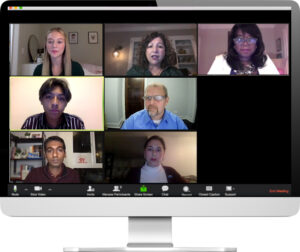
Moises Hernandez loves his family, but he wouldn’t ask them to pay for college tuition, let alone vital necessities to a UCLA student like housing, food and textbooks. As a first-year transfer student majoring in philosophy, Hernandez counts on the federal Pell Grant.
“Without that money, I wouldn’t be able to pay for my housing, my books, my food,” he said. “I don’t receive any support from my family. They don’t have the income to financially support me, although they do support me morally and I really appreciate that.”
About one-third of UCLA students receive Pell Grants, which have a current maximum yearly award of $6,345. In recent months, the higher education community has begun an effort to double the amount of the Pell Grant. The UCLA Undergraduate Students Association Council (USAC) Office of the External Vice President and UCLA Government and Community Relations hosted a “Double the Pell” virtual panel in early December, deep diving into the world of this critical form of financial aid and answering students’ questions.
“As a public institution we have a unique responsibility to advocate for the financial needs of our students, to ensure that we can meet our public mission, and to give them the freedom they need to ensure that they can focus on their studies, develop their talent, pursue their academic interests and go on to do amazing things in our community, our state and across the nation and the world,” said Youlonda Copeland-Morgan, vice provost of enrollment management.
Pell Grants are awarded to low-income undergraduate students (average family income of $27,140) to help make college more affordable and accessible. However, the spending power of Pell Grants has dropped from covering 75 percent of four-year tuition 40 years ago to covering just 28 percent today.
“I am thrilled UCLA students are advocating for this,” said Marvin Smith, executive director of financial aid and scholarships. “A doubling of the Pell Grant program would mean more access and more opportunity for higher education pursuit across the higher education spectrum, but especially important to UCLA students.”
Panelists noted that Pell Grants are so important because they take into account the complete college cost and provide flexibility to cover not just tuition, but living expenses and basic needs.
“If it weren’t for that, then I would have to be forcing myself to find other means to pay for my education, and I know many students like myself work multiple jobs to afford housing and food. I’m really thankful (for my Pell Grant),” Hernandez said, adding that working those extra hours takes away from time to study. “And that’s a big problem for students. Our priorities should be learning and focusing on our studies.”
Smith said that statistics show that Pell Grant recipients are more likely to need an extra year or two to graduate versus non-Pell Grant recipients. “Pell Grant recipients report working much more compared to their counterparts. I have the feeling this is underreported. Some Pell students might think if they report their work it might reduce their aid. But they need those funds to meet those daily basic needs, and maybe to help their families.”
Doubling Pell is not an unrealistic request moving into 2021, said Ashley Fumiko Dominguez, associate director for UCLA Federal Relations. “Right now, the time politically is ripe for doubling the Pell, with what we’re seeing across the nation.” She noted that there is already bipartisan support for Pell Grants, and that President-elect Joe Biden has committed to the idea. Dr. Jill Biden is a community college educator and fervent supporter of public education, as well. “This is a nationwide movement,” she said.
USAC External Vice President Aidan Arasasingham said that movement was of “vital importance” to students and that he would be working on a Week of Action regarding doubling Pell come next quarter. The University of California Advocacy Network (UCAN) is also working on public advocacy plans going into 2021.
“This double the Pell Grant idea is really a commitment of the federal government to reinvest in higher education and in low-income students for whom study after study shows that money matters, and if we can reduce barriers in low-income students with an investment like this, it won’t only lead to access, but will end up paying dividends in the long run,” Smith said. “Recipients of Pell Grants graduate, get great jobs, become great taxpayers and repay that investment at the federal level.”


